Madagascar Blu-ray Movie
HomeMadagascar Blu-ray Movie 
BBCBBC | 2011 | 175 min | Not rated | Jun 07, 2011
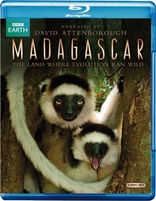
Movie rating
8 | / 10 |
Blu-ray rating
| Users | 0.0 | |
| Reviewer | 3.0 | |
| Overall | 3.0 |
Overview
Madagascar (2011)
Over 80% of Madagascar's animals and plants are found nowhere else on Earth. Discover what made Madagascar so different from the rest of the world, and how evolution ran wild there.
Starring: David AttenboroughNarrator: David Attenborough
| Documentary | Uncertain |
| Nature | Uncertain |
Specifications
Video
Video codec: VC-1
Video resolution: 1080i
Aspect ratio: 1.78:1
Original aspect ratio: 1.78:1
Audio
English: Dolby Digital 2.0 (448 kbps)
Subtitles
English SDH
Discs
50GB Blu-ray Disc
Two-disc set (2 BDs)
Playback
Region free
Review
Rating summary
| Movie | 4.0 | |
| Video | 2.5 | |
| Audio | 2.5 | |
| Extras | 3.0 | |
| Overall | 3.0 |
Madagascar Blu-ray Movie Review
An average AV presentation spoils an otherwise excellent BBC documentary series...
Reviewed by Kenneth Brown May 25, 2011At long last, the Republic of Madagascar steps out of the shadow of DreamWorks Animation's zoo pals in the aptly titled Madagascar, a three-episode documentary series commissioned by the BBC Natural History Unit (NHU) and the Animal Planet network that explores "the land where evolution ran wild." As a result of the sprawling island's considerable size, continental isolation and diverse geography, climate and ecology, over eighty percent of Madagascar's plant and animal species aren't found anywhere else on Earth; a fact that should inspire as much curiosity as it does awe. Like Galápagos before it, Madagascar doesn't settle for intimate nature photography alone. Instead, host and narrator David Attenborough frames the NHU's breathtaking imagery with the narrative of a beautiful natural kingdom cut off from the rest of the planet, the fascinating creatures who rose to rule and dominates its lands, and the waning majesty of an already tattered ecosystem that, thanks to ever-increasing human activity, is in danger of disappearing forever.
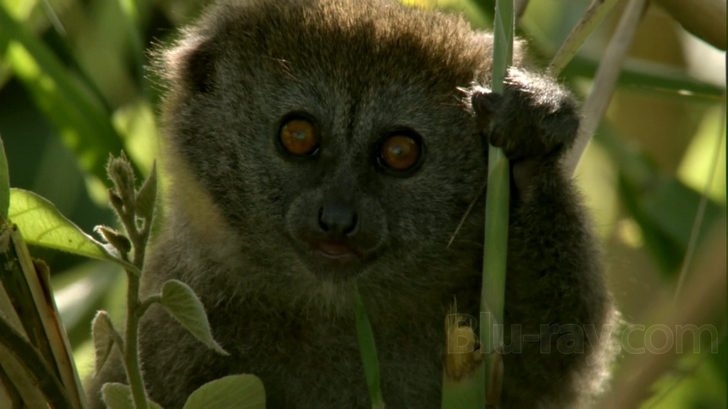
"How tragic it would be to lose it before we've even understood it all."
The BBC NHU photographers travel to the shores, highlands, nature reserves, forests and farflung corners of Madagascar, capturing the island's most extraordinary sights and documenting its most captivating creatures over the course of eighteen months. Their journey begins in "Island of Marvels" with an introduction from Attenborough, an overview of Madagascar's separation from the African and Asian continents, and a breakdown of its eventual isolation and inevitable experiments in evolution. But it's the island's wildlife that steals the series' first episode. Lemurs, easily Madagascar's most familiar natives, dive, leap, dart, roll and climb as if the towering jungle trees and sharp rocks that comprise the primates' stomping grounds present little challenge. Joining them are predatory fossas, cat-like hunters whose lineage includes the mongoose; territorial chameleons, hissing, fighting and vying for control of the jungle canopies; giraffe-necked weevils, the females of which go to meticulous lengths to prepare for a single egg; one of the world's tiniest reptiles, the pygmy chameleon; strange and powerful insects, many of them as clever and crafty as the omnivory lemurs who snatch other bugs up for a snack. To film each species, the NHU team treks to some of the most perilous places the island has to offer: a razor-sharp sea of limestone rock formations, a secluded habitat in the middle of an enormous lake, the depths of the darkest waters and a number of other locales sure to drop a few jaws.
"Lost Worlds" focuses on Madagascar's mountain-strewn rain forests; a dense network of tangled jungles that's home to more than half of the island's unique species, many of which have never been caught on film before the NHU photographers wound their way to the heart of the rain forest. Carnivorous plants feast on flesh, wasps stalk tadpoles scrambling to free themselves from their gummy aerial nurseries, ring-tailed lemurs find high-altitude solace among massive stones in the coldest part of the region, frogs turn on each other to survive, black and gold chameleons burrow into the ground, leaf tailed geckos rely on incredible camouflage for protection, nocturnal aye ayes prowl beneath the stars, and the only remaining silky sifakas in the world -- a rare species of large, white lemur -- withdraw into the relative safety of the island nation's deepest valleys. Through it all, the NHU team delivers a remarkable account of life on the edge while Attenborough provides a near-perfect blend of scientific fact, amusing observation and storytelling prowess. It also calls attention to the series' lone point of contention though. Unlike most BBC Earth tie-ins, Madagascar tends to dwell on one subject longer than it should, hitting viewers with a bit of redundancy in the process. It doesn't amount to a debilitating distraction in any way, but BBC Earth-ers may notice the latest series' pacing isn't as tight, nor are its developing themes as compelling, as previous productions.
Regardless, "Land of Heat and Dust" serves the series nicely and reveals just how drastic the differences are between the regions of Madagascar. Descending into the southwest, the NHU photographers work their way across an unforgiving wasteland in which water is scarce and rain even more so. An arid forest of poisonous trees is home to white lemurs that band together in family units called troops, vasa parrots use deception to feed their chicks, the world's smallest primates indulge their sweet tooth, thousands of frogs suddenly mate when a rare storm brings water suitable to nurturing their eggs, and a species of chameleon hatches during the rain, ages rapidly, breeds quickly and dies within three months of its birth. To call these creatures intriguing would be a gross understatement; to simply watch them all disappear would be a great offense. And yet, in true BBC Earth fashion, we soon learn that Madagascar's wildlife is under constant threat from man and his expanding cities, booming populations, slash-and-burn deforestation and weak national park boundaries. Is there hope? Even with increased international awareness? As more and more documentary series come and go, I fear there isn't much hope to be had. Be that as it may, I hope the BBC Natural History Unit is churning out nature documentaries until the last leaf falls and the last animals takes its last breath. Their productions are unlike any other, even when it comes to a second-tier BBC Earth series like Madagascar. Now if only its Blu-ray release weren't so problematic...
Madagascar Blu-ray Movie, Video Quality 
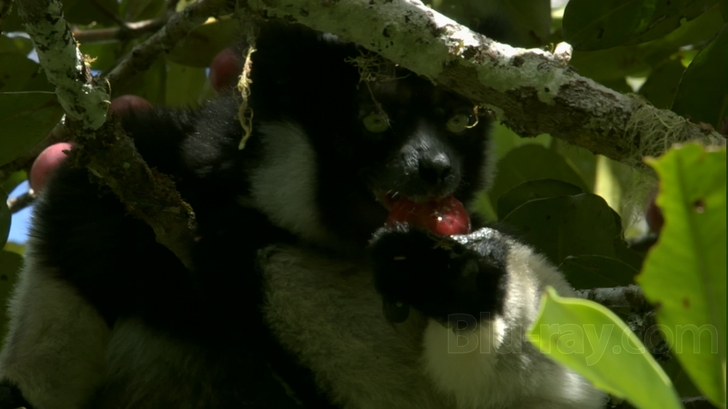
"It's decent enough, I suppose." Admittedly, it isn't the sort of sentiment I expect to settle over me after watching the high definition presentation of a BBC NHU documentary series. And yet here we are: Madagascar's 1080i/VC-1 encode is, sad to say, less than spectacular. It's quite underwhelming actually. Colors are certainly vibrant: greens are lush and lively, earthtones are warm, black levels are satisfying on the whole (albeit altogether imperfect) and contrast is consistent from episode to episode, even though it tends to be murky. Unfortunately, detail is spotty from the outset. Fur, hair and scales aren't nearly as crisp or distinct as documentary regulars have become accustomed, wide shots of leafy jungle canopies are rather soft, edge definition is malleable and fine textures aren't refined or rewarding in the least. Not every shot disappoints outright; no, this particular breed of disappointment creeps in like the stealthy predator it is. Other problems surface again and again. Mild to moderate banding is a frequent offender, at-times significant macroblocking, artifacting and mosquito noise undermine the integrity of the image, and aliasing and ringing make their presence known. A few select scenes even border on DVD quality, startling as that might seem. It doesn't take long to realize Madagascar isn't the stunner it should be or even the shoulder-shrug it could be.
Madagascar Blu-ray Movie, Audio Quality 
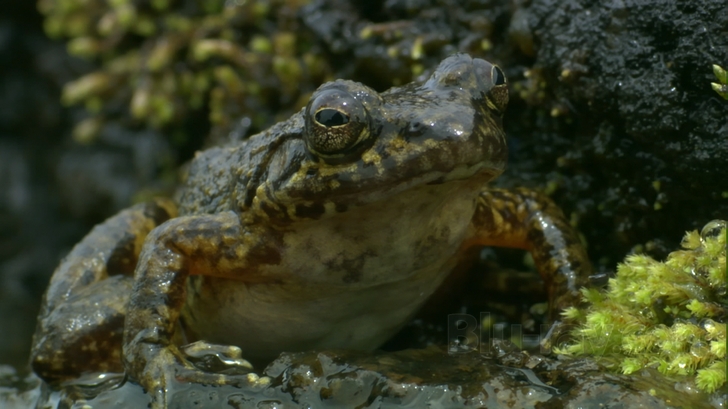
Madagascar is saddled with a dull 448kbps Dolby Digital stereo mix that doesn't enhance the awe or the wonder of the region or the series. David Attenborough's narration sounds just fine, as do the rustling trees, murmuring waterfalls and delicate lemur cries that fill the soundscape. But it's adequate at best. Without any LFE oomph, rear speaker zing or lossless sheen, the entire experience is DVD quality. Even the music sounds a cramped in its cage, leaving little to praise in BBC's underwhelming audio offering.
Madagascar Blu-ray Movie, Special Features and Extras 
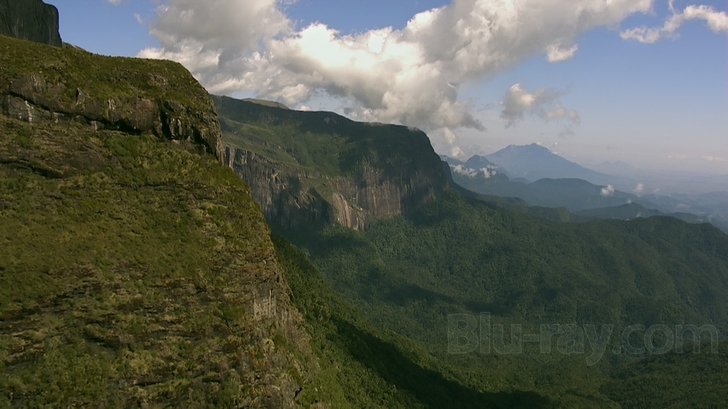
While spread across two BD-50 discs, Madagascar doesn't offer all that many extras. That said, its short production featurettes, newly produced Attenborough documentary and television special with Charlotte Uhlenbroek add decent value to the release.
- Madagascar Diaries (HD, 28 minutes): A behind-the-scenes featurette trails each episode of the series. Like most BBC Earth releases though, the shorts aren't accessible from the disc's main menu.
- Attenborough and the Giant Egg (HD, 59 minutes): David Attenborough hosts and narrates this bonus documentary originally broadcast on BBC Two earlier this year. In it, Attenborough returns to Madagascar to unravel the mysteries and uncover the fate of one of the largest birds on the planet: the long-extinct Aepyornis, more commonly known as the Elephant Bird.
- Lemurs of Madagascar (SD, 39 minutes): Primatologist Charlotte Uhlenbroek hosts this secondary documentary that hones in on the lemurs of Madagascar. Unfortunately, it's presented in standard definition.
Madagascar Blu-ray Movie, Overall Score and Recommendation 
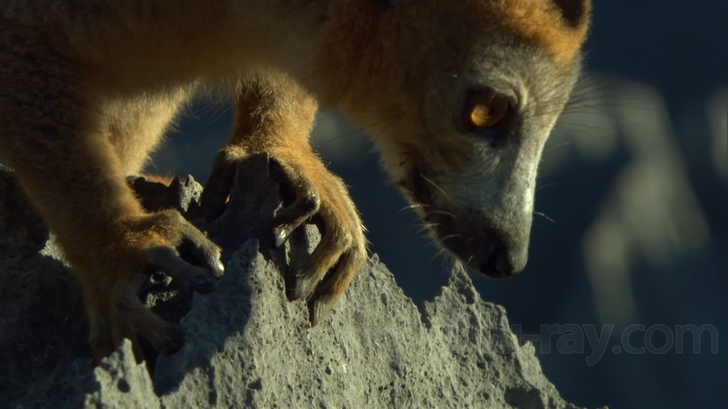
Normally I'd have to repress hyperbole at every turn, but this is one BBC NHU release that doesn't deserve anything of the sort. Its video transfer frankly doesn't do justice to its NHU team's photography. Its Dolby Digital stereo mix, while passable, is almost indiscernible from its DVD counterpart. And its supplemental package, despite clocking in upwards of two hours, doesn't truly seal the deal. Don't misunderstand: Madagascar is a strong, worthwhile three-episode documentary series. It's just a shame the same can't be said of its 2-disc Blu-ray release.
Similar titles
Similar titles you might also like

The Great Rift
2009

Nature's Most Amazing Events
2009

Galápagos
2006

Wild Pacific
2008

Human Planet: The Complete Series
BBC
2011

Yellowstone: Battle for Life
2009

Africa
2013

Wild China
2008

Great Barrier Reef
2012

Life
BBC / Narrated by David Attenborough
2009

Frozen Planet
The Original UK Series
2011

Life Story
2014-2015

Ganges
2007

Wonders of the Solar System
2010

The Blue Planet: Seas of Life
2001

The Hunt
2015

Wonders of the Universe
BBC
2011

Planet Earth
The Complete Series
2006

Great Migrations
2010

Kingdom of Plants 3D
Kew 3D
2012